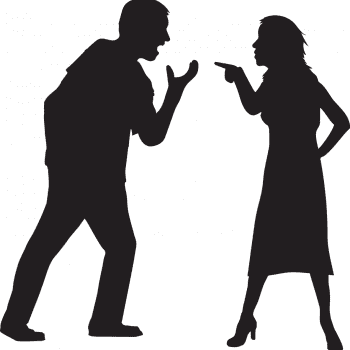To Train Up A Child, chapter 5, part 2
Last week we began the chapter on “The Rod” and learned that parents must spank whether or not they want to, because God commands them to spank. This week we continue with that chapter and explore some of the reasons parents choose not to spank.
UNDERSTANDING ONE’S OWN FEELINGS
An emotionally weak mother often looks to her child’s clinging dependence for her own self-fulfillment. She finds a deep need met within herself as she constantly dotes over the infant’s every want. Her consuming passion for the child, which she takes to be love, is too sacred to jeopardize. Her insecurity causes her to consider only what she perceives to be her loss in the act of spanking. She is afraid to do anything that might cause the children to reject her. If such is the case, she is not loving the child, she is loving herself. Her own feelings take precedence over the child’s needs.
The pitiful look of betrayal in his poor little eyes just breaks her suffering heart. It would hurt her too much to obey God in training up her child. Because of her fear of personal emotional suffering, she neglects the rod. “He that spareth his rod hateth his son: but he that loveth him chasteneth him betimes (Prov. 13:24).”
It is true that there are some mothers (and fathers!) who cannot say “no” to their children. It is possible that in some cases this stems from a fear of rejection. This is indeed a problem, though not necessarily for the reasons you might think, and certainly not for the reasons Michael thinks. It is a problem if there is anyone you cannot say “no” to. Similarly, any relationship where one party lives in fear of rejection by the other is not healthy. It is important to be grounded in yourself enough that your own emotional wellbeing does not depend upon your child (or your partner, or your mother, etc.).
But that’s not really what Michael is talking about here. He’s not talking about self care or asserting healthy emotional boundaries. He’s talking about disassociating yourself enough from your own love for your child to be able to hit that child even when your conscience screams that it is wrong.
In her own need, she is so naive as to believe that her “sweet” child will grow out of it and be a wonderful person. She thinks, “Just give him a little more time; he doesn’t understand yet.”
To set aside one’s own feelings for the purpose of objectively regarding the good of the child is the only true love. If a mother should smother her baby while kissing him, she has not loved him.
Again, there are some parents whose inability to say “no” does cause problems for both their children’s development and their own wellbeing. I really hate to say this because of the way I see it twisted, but sometimes children do need to hear “no.” We as people cannot go through life always having our own way in everything and never hearing someone tell us “no.” Of course, children should be allowed to “talk back” (by that I mean stand up for themselves and assert an opinion), and to negotiate and look for compromises, because these things are also part of a healthy adulthood, and childhood is preparation for adulthood. It is also possible for a child to feel smothered by a parent’s love. Children need some degree of autonomy and independence even when they are small. But again, I don’t feel like this is what Michael is actually talking about here.
I once again feel like Michael has no idea why a parent like myself has chosen not to spank. I’m an “emotionally weak mother” and I am not codependent upon my children (which is what Michael is describing here). I’m not choosing not to spank simply because I fear my children’s rejection, I’m choosing not to spank because I honestly believe that intentionally inflicting physical pain on others is wrong. What is more intimate or personal than someone’s own body? I refuse to turn my children’s bodies into instruments of torture, turning the only thing they truly have possession of into a weapon against their most inmost selves. But rather than actually facing these sorts of objections, Michael plays off all naysayers as “emotionally weak” and even selfish.
Her own anger may cause her not to trust her motives in corporal punishment. See chapter 3, PARENTAL ANGER. Then again, this distrust of the rod may go back to the memory of a tyrannical, unreasonable father. She may have vowed, “I will never be like my father. I will love my children. They will not fear me the way I feared my father.” The father not only hurt her, he is now hurting her children by causing her to react in the opposite extreme.
Oh dear. Michael is telling parents who suffered physical abuse as children themselves that if they do not today spank their children they are perpetuating their parents’ abuse. You know what? Not wanting your children to fear you like you feared your father is a damn good reason not to spank. Michael’s words are chilling and completely without empathy.
Michael seems to assume that if parents do not employ “the rod” they have no other tools available to them to help shape their children’s character and prepare them for adulthood. This is false. Parents can create boundaries for their children without ever needing to spank. Parents can be consistent and even strict without ever needing to spank. And parents who work to move away from punitive punishment in general are still not without tools to guide their children.
Sometimes images from the past cause a mother to have deep foreboding every time the father spanks the children. Mothers who have been conditioned to associate anger with discipline impute a motive of anger to anyone who is spanking a child. The child perceives the protectiveness of the mother and will whine for her when the father attempts to discipline. Her lack of commitment to the father’s discipline prevents it from being effective and causes deviousness in the child. It is time to stop reacting to the past and start acting as God and sound reason dictate.
Let’s go over some of the things Michael has said for a moment. First, Michael has elsewhere told women not to report physically abusive husbands to the authorities unless the abuse rises to the level of “bone-breaking.” Second, elsewhere in this very book Michael has told women whose husbands practice excessive discipline to say nothing and instead work to ensure that the children are never disobedient to their father and so escape his excessive discipline. Here, Michael tells women that even if their husbands’ discipline of the children is combining with their own past abuse to cause flashbacks or PTSD, still they must say not a word against it, because if they have a “lack of commitment” to their husband’s discipline they will cause “deviousness” in their children. And finally, Michael paints mothers’ “protectiveness” as a universally negative thing. This ought to go without saying, but this is incredibly toxic.
Let’s go through it point by point, shall we?
First, if a man’s use of corporal punishment is causing his wife anxiety and distress because of her own childhood abuse, that is something the two of them need to communicate about. In many such cases, it will probably be best to leave aside corporal punishment and turn to other tools. I would say the same thing if the positions were reversed, and a woman’s use of corporal punishment was causing her husband distress because of his childhood abuse.
Second, each parent acts as a check against any tendency to abuse on the part of the other parent. When children have two parents, they have two protectors. If one parent is abusing the children, the other parent should step in to protect the children, and vice versa. Here, though, Michael is systematically dismantles mothers’ ability to fulfill this protective role. Yes, Michael would probably argue that in the excerpt above he is only talking about cases where husbands’ use of physical discipline is non-abusive, but I’m pretty sure Michael’s abuse meter is broken. Further, he has never given women tools to deal with husbands who are abusive toward their husbands, and has instead only told them to hang in there and not contradict their husbands’ discipline.
Third, if parents disagree about what discipline is appropriate, they need to be communicating about that. I’m actually going to break with common wisdom here and say that both parents do not need to be in universal agreement on disciplinary matters, and that it is okay for the children to know that their parents do not always agree on issues surrounding discipline, consequences, and punishment. In fact, I would argue that once they’re old enough children themselves should have input on things like appropriate consequences and privileges. All this said, parents should ideally both at least be on the same page. If each parent employs a completely different philosophy of child rearing, they are going to run into conflict. But this is the sort of thing that involves communication and compromise and should never require a parent to violate his or her own conscience.
Finally, why are we so stuck on mothers here? Is it somehow impossible for fathers to have objections to spanking? In Michael’s world, it is apparently only silly weak codependent women who cannot work up the guts to do so who choose not to spank. And more than that, why doesn’t Michael address how to handle situations where the mother practices excessive discipline and the father is triggered or has concerns? In Michael’s word, women are never abusers.
Some parents fail to use the rod because of peer pressure. They may be in disagreement with their own parents about child training. The modern parent is bombarded with propaganda, supposedly based on the latest psychological research, which villainizes Biblically based child rearing. The parents are shamed and caused to look over their shoulder before applying discipline.
Wow. What a shame that the sort of discipline methods Michael urges parents to adopt have come to be seen by the public as abuse! How terrible that parents should feel the need to look over their shoulder before talking about “breaking the wills” of their children! How awful that parents are listening to research on child psychology rather than following Michael’s uninformed interpretation of a stone age text! How sad that children make their own choices about child training rather than mindlessly parroting those of their parents! Okay, enough sarcasm. But seriously people! Seriously!
Two last thoughts. In Michael’s world, people who disagree with him must do so as a result of peer pressure or propaganda. In Michael’s word, parents who follow his discipline methods make up a persecuted godly remnant. In my world, I will name him for what he is: an enabler.









